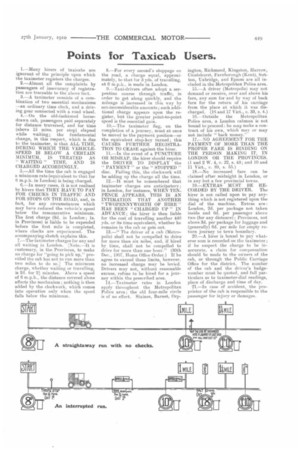Points for Taxicab Users.
Page 15

If you've noticed an error in this article please click here to report it so we can fix it.
1.—Many hirers of taxicabs are ignorant of the principle upon which the taximeter registers the charges. 2.—Almost all the complaints by passengers of inaccuracy of registration are traceable to the above fact.
3.—A taximeter consists of a combination of two essential mechanisms —an ordinary time clock, and a driving gear connected with a road wheel.
4.—On the old-fashioned horsedrawn cab, passengers paid separately for distance traversed, and for time (above 15 mins. per atop) elapsed while waiting ; the fundamental change, in this respect, which is due to the taximeter, is that ALL TIME, DURING WHICH THE VEHICLESPEED IS BELOW A CERTAIN MINIMUM, LS TREATED AS " WAITING " TIME, AND IS CHARGED ACCORDINGLY.
5.—All the time the cab is engaged a minimum rate (equivalent to that for 6 m.p.h. in London) is being charged.
6.—In many cases, it is not realized by hirers that THEY HAVE TO PAY FOR CHECKS IN TRAFFIC AND FOR STOPS ON THE ROAD, and, in fact, for any circumstances which may have reduced the vehicle's speed below the remunerative minimum. The first charge (8d. in London ; Is. in Provinces) is liable to be expended before the first mile is completed, where checks are experienced. The accompanying sketch explains this. 7.—The taximeter charges for any and all waiting in London. 1Note.—[t is customary, in the Provinces, to make no charge for "going to pick up," pro-, vided the cab has not to run more than two miles to do so.] The minimum charge, whether waiting or travelling, is 2d. for 25 minutes. Above a speed of 6 m.p.h., the distance covered alone affects the mechanism ; nothing is then added by the clockwork, which comes into operation only when the speed falls below the minimum. 8.—For & ry second., stoppage on the road, a charge equal, approximately, to that for 3 yds. of travelling, at 6 m.p.h., is made in London.
9.—Taxi-drivers often adopt a serpentine course through traffic, in order to get along quickly, and the mileage is increased in this way by not-inconsiderable amounts; such additional charge appears upon the register, but the greater point-to-point speed is the essential gain. 10.—The taximeter flag, on the completion of a journey, must at once be moved to the payment position—or the equivalent stop-key turned ; this CAUSES FURTHER REGISTRATION TO CEASE against the hirer. 11.—In the event of a PUNCTURE OR MISHAP, the hirer should require the DRIVER TO DISPLAY the " PAYMENT " or the" STOPPED" disc. Failing this, the clockwork will be adding up the charge all the time.
12.—It must be remembered that taxinieter charges are anticipatory ; in London, for instance, WHEN TENPENCE APPEARS, THIS IS AN INTIMATION THAT ANOTHER " TWOPENNYWORTH OF HIRE" HAS BEEN "CHARGED UP" IN ADVANCE; the hirer is then liable for the cost of travelling another 440 yds. or its time equivalent, whether he remains in the cab or gets out. 13.—" The driver of a cab (Metropolis) shall not be compelled to drive for more than six miles, and, if hired by time, shall not be compelled to drive for more than one hour." (30th Dec., 1907, Home Office Order.) If he agree to exceed these limits, however, no increased charge may be levied. Drivers may not, without reasonable excuse, refuse to be hired for a journey within the prescribed area.
14.—Taximeter rates in London apply throughout the Metropolitan Police area ; the old four-mile circle is of no effect. Staines, Barnet, Orp
ington, Richmond, Kingston Harrow, Ctuslehurst, Farnborough (Kent), Sutton, Uxbridge, and Epsom are all included in the Metropolitan Police area.
15.—A driver (Metropolis) may not demand or receive, over and above his fare, any sum for and by way of back fare for the return of his carriage from the place at which it was discharged. (16 and 17 Viet., c. 33, s. 4.)
16.—Outside the Metropolitan Police area, a London cabman is not bound to proceed : he may make a contract of his own, which may or may not include "back money."
17.—NO AGREEMENT FOR THE PAYMENT OF MORE THAN THE PROPER FARE IS BINDING ON THE PERSON MAKING IT, IN LONDON OR THE PROVINCES. (1 and 2 W. 4, c.. 22, s. 43; and 10 and 11 Viet., c. 89, s. 55.) 18.—No increased fare can be claimed after midnight in London, or in any but a few provincial towns. 19.—EXTRAS MUST BE RECORDED BY THE DRIVER. The hirer is not called upon to pay anything which is not registered upon the dial of the machine. Extras are : London, 2d. per package not taken inside and 6d. per passenger above two (for any distance); Provinces, not above 3d. per package for luggage and (generally) fid. per mile for empty return journey to town boundary. 20.—A hirer is bound to pay whatever sum is recorded on the taximeter ; if he suspect the charge to be inaccurate, a claim for compensation should be made to the owners of the cab, or through the Public Carriage Office for the district. The number of the cab and the driver's badgenumber must be quoted, and full particulars as to taximeter-dial readings, place of discharge and time of day. 21.—In case of accident, the proprietor of the cab is responsible to the passenger for injury or damages.




















